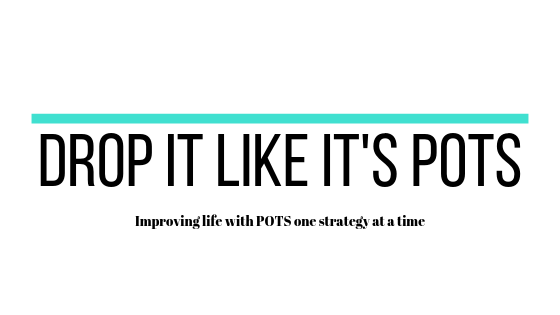Deep breathing is one of my favorite ways to improve life with POTS. I learned this strategy from the Mayo Clinic during the Chronic Fatigue/Fibromyalgia class I attended shortly after I was diagnosed with POTS and ME. Deep breathing has a positive effect on the nervous system both in the immediate present and in the long-term due to neuroplasticity. Neuroplasticity is the brain’s ability to form new neural pathways to compensate for disease or injury.
How does deep breathing help?
Mayo teaches that the brains of people with POTS and ME are in a state called “central sensitization” in which the sympathetic or “fight and flight” part of the nervous system is overactive. Deep breathing is a way to counteract that excessive sympathetic nervous system activity. Deep breathing stimulates the vagus nerve which promotes parasympathetic or “rest and digest” nervous system activity.
Our bodies cannot be in a sympathetic and a parasympathetic state at the same time. So, by deep breathing you are setting your body in the parasympathetic state. Over time, because our brains are neuroplastic, they become accustomed to that parasympathetic state and will default to it easier.
Sympathetic vs. parasympathetic nervous system states
Sympathetic:
- “Fight or flight”
- Uses a lot of energy
- Releases adrenaline and noradrenaline
- Makes digestive system run slower
- Dilates blood vessels
- Increases heart rate
Parasympathetic:
- “Rest and digest”
- Promotes digestion
- Calming
- Produces saliva and tears
- Decreases heart rate
As you can see, basically all the things we DON’T need more of with POTS are involved in the sympathetic state and the beneficial things are in the parasympathetic state.
If POTS benefits from a calmer nervous system, does that mean it is a psychological disorder like anxiety?

There is no shame or stigma about mental health. However, let me be clear because too often the POTS and ME communities have fought against psychosomatic labels. ME and POTS are NOT psychological or psychosomatic disorders.
Here is a study that demonstrates that POTS patients do not have more anxiety than controls. A doctor at Mayo showed me a slideshow of studies demonstrating the physical changes that occur in ME and it was astounding. I wish I could remember even half of them, but it was a blur at the time. One study that stuck out to me was that people with ME makes more waste metabolites (ex. lactate) from movement. It’s like our bodies have run a marathon but all we’ve really done is walk across the room. There are numerous physiological changes that occur in ME.
ME and POTS are neurological disorders and deep breathing has an effect on the nervous system. I like to view deep breathing as a “nervous system hack”.
How to do deep breathing
Deep breathing is very easy to learn. As long as you are inhaling for more than 4 seconds and exhaling for more than 4 seconds, you are stimulating the vagus nerve and putting your nervous system in a parasympathetic state. To learn how to deep breathe visit this YouTube video or download the free app Breathe2Relax. The YouTube video’s animation is super creepy and will haunt my nightmares but it does the job. The app is instructive and you can use it to do deep breathing sessions with calming music and breathing cues.

How I incorporate deep breathing in my life
I like to incorporate deep breathing in a few ways. I do a few minutes of deep breathing prior to my daily meditation practice.
I also deep breathe randomly throughout the day. Whenever it pops into my head, I will do a quick session for a few minutes using one of the techniques I detail below. I also make a point of doing a deep breathing session when I feel that I am carrying tension (I notice it most in my abdomen). For example, I have two little boys. They love to climb things and jump off things that freak me out, but I know that I need to let them be… enter deep breathing. I think this trains my brain to handle stress in a calmer way, which is healthy whether you are ill or not.

Different types of deep breathing
There are many ways you can deep breathe, which is great because you can mix it up when you get bored of one type. These are the types I have tried and enjoy:
- Equal breathing- Breathing in and out deeply for the same amount of time.
- 4-7-8 breathing- Inhale for 4 seconds, hold your breath in for 7 seconds, and then breathe out for 8 seconds.
- 4-4-8 breathing- Inhale for 4 seconds, hold in for 4 seconds, and then breathe out for 8 seconds.
- Square breathing- An example of this would be breathe in for 4 seconds, hold in for 4 seconds, breathe out for 4 seconds, hold out for 4 seconds.
- Ujjayi breathing- This is my personal favorite type of deep breathing. This video on Youtube explains it well. It is a way of deep breathing where you create a tension in your throat to make an airy sound. Deep breathing this way keeps me focused on breathing and the breath sounds like the ocean so it is even more relaxing. In the first half of the video she does it with her mouth open to help you learn, but in the second half of the video she shows you how to do it with your mouth closed. I definitely do it the mouth closed way so I don’t scare people.

Side note- Is central sensitization the definite cause of POTS?
Central sensitization is a theory. The cause of POTS is not completely understood. Another theory is that POTS is an autoimmune disease. Researchers have found antibodies to adrenergic receptors present in POTS patients. Adrenergic receptors mediate the effects of adrenaline and noradrenaline, substances which increase heart rate. The studies on antibodies in POTS are small but still impactful on our understanding of the syndrome. I asked my neurologist who also does research on dyautonomia, “Is POTS an autoimmune disease?” and she said “We’re working on it.” She also mentioned that the underlying cause can be multifactorial and vary from person to person.
We don’t know for certain what causes POTS and ME but parasympathetic nervous system stimulating methods like deep breathing seem to address part of the mechanism involved. I feel this is a great strategy for everyone including healthy people. Modern living as it is puts our brains in an unnaturally overstimulated and oversensitized state. We could all use some parasympathetic stimulation.
Does anyone else do deep breathing? Have you noticed any effects from doing it?
Disclaimer: I am not a medical professional. Statements on this site are not meant to be taken as medical advice. These statements reflect my personal experiences having mild-ish post-viral POTS and ME. Due to the wide spectrum of these diseases, comorbidities, and everyone being different, your experiences may be very different than mine.
Note: If you post a comment, this site does NOT have a feature to notify you of responses to your comment. I have not found a good solution for that yet. However, I usually respond to every comment in a timely manner, so be sure to check back.

9 Comments
Hey Jackie! Enjoy :)!
Good to know! I have a very stressful Customer Service job & boy, there are times when you need to shed the stress!
Oh, I bet it can get nutty in customer service. I hope these techniques help!
I must confess I have done that exact pose as Ben Stiller! LOL! Thanks for the reminder about doing deep breathing. I tend to only do it during anxiety attacks. Knowing there’s real science behind the benefit of doing it I’m going to start doing it daily!
Haha! Yes, doing deep breathing regularly is good training for your body so that when you are anxious, you can call on the foundation you’ve built more readily, if that makes sense.